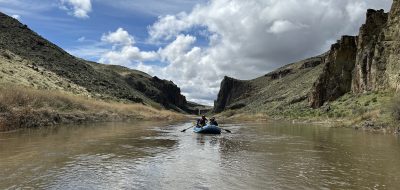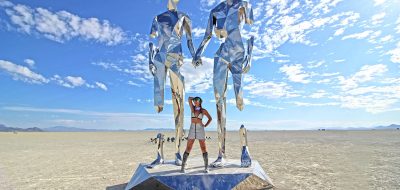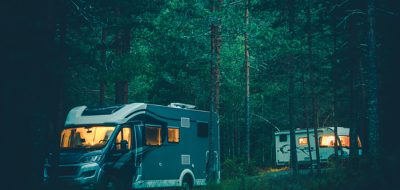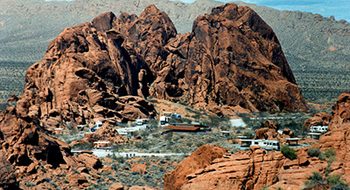By Bob Difley
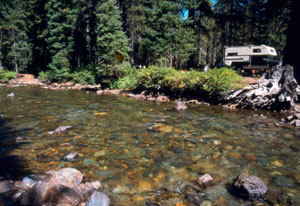 In last week’s post, Moving forward: Surviving your first night of dry-camping I wrote about how to spend a night or two without hookups. This week I go a bit further by looking at how to extend our camping time–actually getting the maximum out of the batteries that provide our house electricity–prolonging the time when we need to go find a hookup or run our engine/generator for an extended length of time to restore the amps–the power–to the batteries. So let’s take a look at the RV’s electrical operation.
In last week’s post, Moving forward: Surviving your first night of dry-camping I wrote about how to spend a night or two without hookups. This week I go a bit further by looking at how to extend our camping time–actually getting the maximum out of the batteries that provide our house electricity–prolonging the time when we need to go find a hookup or run our engine/generator for an extended length of time to restore the amps–the power–to the batteries. So let’s take a look at the RV’s electrical operation.
What could be easier to use in an RV than the electrical system? You flip a switch and there is light. Push a button and your coffee maker produces a perfect cup of Java. Nothing to think twice about–as long you keep an electrical wire connected to your house-on-wheels and the utility company’s equipment doesn’t brown out. In your stick house, when these fail, there is not much you can do about it but wait. And wait. Until somebody else fixes it.
But in your RV, it’s a different story. If you practice the cavalier attitude about electrical usage in your rig that you probably do in your house, chances are that your house battery will soon be completely depleted. The reason, of course, is that your wire to your house/RV continuously feeds infinite current, while when boondocking you are using up the finite stored electricity in your house battery.
There are two ways to deal with an RV’s limited source of electrical power. (1) limit or cut back on usage (conserving), the subject of this blog, and the other is to find additional sources (main engine, generator, solar, wind, or chipmunks on a treadmill), which is next Saturday’s subject.
Fortunately, or unfortunately if you are an energy hog, an effective way to improve your electrical usage is to change old energy-wasting habits. Once you’ve allowed those habits to die a well deserved death, you will find your new efficient habits aren’t as draconian as you may have thought. And running a generator for hours every day is NOT an efficient use of power; it is a very slow way to charge your batteries, makes noise (an alien sound in the boonies and annoying to neighbors), uses fossil fuels, requires carrying extra gas cans (if using a portable generator), requires service and maintenance, and will eventually break down requiring repairs or costly replacement.
Try out these ways to conserve the energy you have so you can stay camped out there by that mountain stream for a day or so longer.
- Turn off anything that pulls electricity from your battery–lights, radio, TV, computer–when not in use.
- Turn your porch light off (a particular annoyance to me when I am not so fortunate to be able to camp away from neighbors that leave the light on destroying my night vision).
- Coordinate your generator running time and using power-hungry appliances. Schedule showers (your water pump uses 8 amps), water heater, microwave, coffee grinder, and dishwashing all within the same period of time when you can run your generator to power them, rather than pull juice out of your batteries. This also charges your house battery/ies at the same time.
- Rise and go to bed with the sun. This cuts your light usage down considerably. Florescent lights use about 1 amp each. Better is to install LED lights that are very energy stingy and will last the life of your rig.
- If you read in bed, try using a book light that uses rechargeable batteries that you can use over and over. You can recharge the batteries when you hook up next time or plugged in to your tow vehicle or dingy cigarette lighter that will charge when on exploration trips. You won’t run down your house batteries with your RV’s lights, and you will probably win points from your trying-to-sleep mate by not lighting up the whole bedroom.
- Forget our forced air furnace except when running your generator. It sucks up the juice from your battery and will discharge it in one night if left on thermostat. Pull up an extra blanket or install a propane heater (more on that in a later post). Turn your generator on in the morning to run your furnace to get rid of the morning chill and also to make your coffee if you haven’t yet switched to a French press or Melitta method instead of an electric coffee maker.
- Monitor your house batteries charge with a voltage meter so you don’t run them down too low, which can damage them. Deep cycle batteries are considered fully charged at 12.6 volts and completely discharged at 10.6 volts. Recharge before they get below about 12.0 volts.
Next Saturday’s post will be on how to upgrade your electrical system to appliances that require less power and how to use alternate power sources.
For more RVing articles and tips take a look at my Healthy RV Lifestyle website, where you will also find my ebooks: BOONDOCKING: Finding the Perfect Campsite on America’s Public Lands (PDF or Kindle), 111 Ways to Get the Biggest Bang for your RV Lifestyle Buck (PDF or Kindle), and Snowbird Guide to Boondocking in the Southwestern Deserts (PDF or Kindle), and my newest, The RV Lifestyle: Reflections of Life on the Road (PDF or Kindle reader version). NOTE: Use the Kindle version to read on iPad and iPhone or any device that has the free Kindle reader app.

